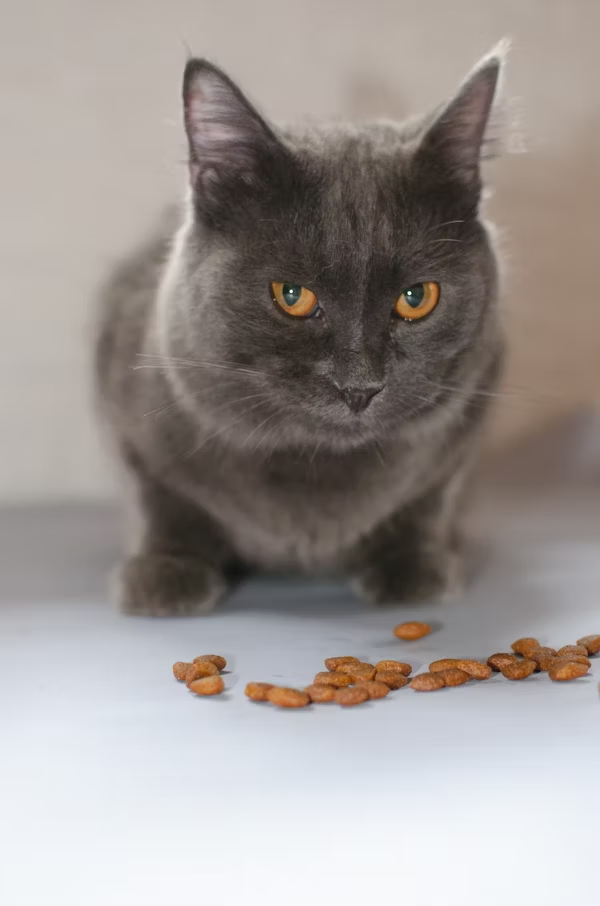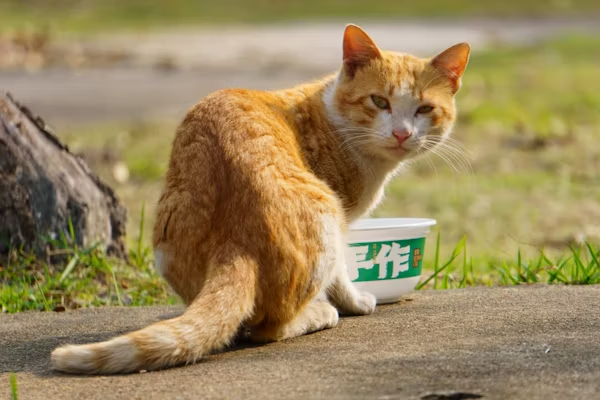Want to improve your pet’s health through nutrition? Discover what makes up a balanced diet for cats and dogs—plus tips, vet-backed facts, and affiliate-friendly product recommendations.

Affiliate Disclosure
Fuzzy Pawz Corner participates in affiliate programs including Amazon Services LLC. As an Amazon Associate I earn from qualifying purchases made through links, at no extra cost to you.
Feeding your pet the right diet is one of the most important ways to keep them happy, active, and thriving for years to come. But with so many brands and options on the market, how do you know what’s actually healthy?
Whether you’re raising a playful kitten or caring for a senior dog, this guide will help you understand what a well-balanced pet diet looks like—and how to tailor it to your furry friend’s needs.
What Makes a Healthy Diet for Dogs and Cats?
A balanced pet diet should include:
• Protein: Essential for muscle growth and repair
• Fats: Provide energy and support skin/coat health
• Carbohydrates: Offer quick energy and fiber
• Vitamins & Minerals: Support immune health, bone development, and organ function
• Water: The most critical nutrient of all
According to the American Kennel Club and American Veterinary Medical Association, dogs and cats have different nutritional needs—so feeding the right species-specific food is essential.
Best Diet for Dogs
1. Choose a High-Quality Protein Source
Look for real meat (chicken, beef, salmon, etc.) as the first ingredient.
Avoid:
• By-products
• Excess fillers (like corn or soy)
• Artificial preservatives
“The Best Diet for Dogs: What to Look For”
Feeding your dog a nutritious, high-quality diet is key to supporting their overall health, energy, and longevity. Look for dog food made with real meat, whole ingredients, and free from artificial fillers or by-products.
Whether you’re focusing on digestive health, joint support, or a shiny coat, choosing the right food makes all the difference.
Explore one of the healthiest dog food options here: Click Here
Your pup deserves a diet that keeps their tail wagging and their health thriving.
2. Watch for Life Stage-Specific Formulas
• Puppies: Higher in protein and fat for growth
• Adults: Balanced for maintenance
• Seniors: Lower in calories, higher in joint support (glucosamine)
Dog
| Life Stage | Age Range | Nutritional Focus |
|---|---|---|
| Puppy | Birth to 1 year (varies by breed) | Higher protein & fat, DHA for brain development, calcium for bones |
| Adult Dog | 1 to 7 years (smaller breeds may mature sooner) | Balanced nutrients for maintenance, energy, and immune support |
| Senior Dog | 7+ years (earlier for large breeds) | Joint support, lower calories, added fiber, antioxidants |
Cat
| Life Stage | Age Range | Nutritional Focus |
|---|---|---|
| Puppy | Birth to 1 year (varies by breed) | Higher protein & fat, DHA for brain development, calcium for bones |
| Adult Dog | 1 to 7 years (smaller breeds may mature sooner) | Balanced nutrients for maintenance, energy, and immune support |
| Senior Dog | 7+ years (earlier for large breeds) | Joint support, lower calories, added fiber, antioxidants |
3. Include Healthy Treats (in moderation)
• Lean meat-based treats
• Dental chews
• Freeze-dried single-ingredient snacks
“Healthy Treats for Pets: A Smarter Way to Reward”
Not all pet treats are created equal. Choosing healthy treats made with natural ingredients can support your pet’s overall well-being—without the added fillers, artificial flavors, or excess calories.
Whether you’re training or just showing love, it’s important to offer snacks that are both nutritious and delicious.
Check out these highly rated healthy treats for pets: Click Here for your K9 Pal, or Click Here for Purrfect Companion.
Reward your furry friend the smart way—with treats that taste good and do good.
Best Diet for Cats
1. Cats Are Obligate Carnivores
They need a diet rich in animal protein—not plant-based proteins.
Top ingredients to look for:
• Chicken, turkey, or fish
• Taurine (an essential amino acid for heart & eye health)
• Omega-3s for a shiny coat
“Healthy Food for Cats: Fueling Their Wild Side”
Cats need a high-protein, low-carb diet to truly thrive. The best cat foods mimic their natural carnivorous needs—packed with real meat and free from unnecessary fillers or grains.
Wet food with minimal processing and freeze-dried raw toppers can boost your cat’s nutrition while supporting digestion, hydration, and a healthy coat.
Discover a high-quality cat food option here: Click Here
Support your feline friend’s instincts with food that’s as close to nature as it gets.
Overeating can lead to serious health issues like obesity, joint problems, and even diabetes in pets. It’s important to understand the risks and learn how to manage your pet’s weight properly.

2. Wet vs. Dry Food
• Wet food provides hydration and is easier on kidneys
• Dry food helps with dental health and is convenient
• Combo feeding (both wet and dry) is a great middle ground
3. Avoid Overfeeding
Obesity is a major health risk in cats. Use portion-controlled feeders or feeding charts, and don’t free-feed unless advised by a vet.
For more in-depth information, visit the Association for Pet Obesity Prevention at https://www.petobesityprevention.org/
Supplements to Consider
Talk to your vet before adding supplements, but many pets benefit from:
• Omega-3 fatty acids (for skin, joints, and inflammation)
• Probiotics (for digestive health)
• Glucosamine (for joint support, especially in older pets)
Probiotic Supplements for Pets: What to Know Before You Start”
Adding supplements to your pet’s diet—like probiotic chews—can help support a healthy gut, reduce digestive issues, and boost immune function. But before starting any new supplement, it’s important to talk to your veterinarian to ensure it’s right for your pet’s specific needs.
Once you’ve got the go-ahead, probiotic chews are an easy and tasty way to promote better digestion and overall well-being.
Explore top-rated probiotic chews for pets here: Click Here
Support your pet’s digestive health with a vet-approved daily boost.
Special Diets for Allergies or Conditions
Some pets need special diets due to:
• Food sensitivities (itching, diarrhea, etc.)
• Chronic conditions like kidney or liver disease
• Weight management
In these cases, a vet-prescribed or limited-ingredient diet may be best.
Wrap-Up: Tailor Their Diet, Watch Them Thrive
The best diet for a healthy dog or cat depends on their age, activity level, and individual health needs. Choose foods with whole, recognizable ingredients, and always keep fresh water available.
Recommended Products (Affiliate Links)
• Automatic Feeder with Portion Control
Affiliate Disclosure
Fuzzy Pawz Corner participates in affiliate programs including Amazon Services LLC. As an Amazon Associate I earn from qualifying purchases made through links, at no extra cost to you.